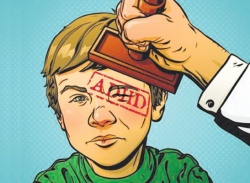Difference between revisions of "ADHD"
m (→Epidemiology) |
(More up to date info on ADHD medications) |
||
| Line 12: | Line 12: | ||
==Treatment== | ==Treatment== | ||
| − | The main treatment of ADHD is | + | The main treatment of ADHD is pharmaceutical stimulant. Initially, [[Ritalin]], a drug based on cocaine, which has unresearched long term consequences, though it has been suggested that they "addle the brain over the long term".<ref>[[Document:The CIA - long-range planning for a drugged and debilitated society]]</ref> A 2016 study on rats suggested "that young people using [[amphetamines]] may have changes in memory and attention well into their thirties."<ref>http://www.madinamerica.com/2016/04/amphetamines_adolescents_ratstudy/</ref> Later it was mostly replaced by [[amphetamine]]-based drugs such as [[Adderall]] and Vyvanse. |
===Questionable efficacy=== | ===Questionable efficacy=== | ||
A 2013 story by ''[[The Atlantic]]'', ''Study: ADHD Symptoms Persist Despite Medication in 9 Out of 10 Kids'', reported on "a new study out of [[Johns Hopkins]] suggests that the "benefits" used to rationalize medication might not even exist".<ref>https://www.theatlantic.com/health/archive/2013/02/study-adhd-symptoms-persist-despite-medication-in-9-out-of-10-kids/273097/</ref> | A 2013 story by ''[[The Atlantic]]'', ''Study: ADHD Symptoms Persist Despite Medication in 9 Out of 10 Kids'', reported on "a new study out of [[Johns Hopkins]] suggests that the "benefits" used to rationalize medication might not even exist".<ref>https://www.theatlantic.com/health/archive/2013/02/study-adhd-symptoms-persist-despite-medication-in-9-out-of-10-kids/273097/</ref> | ||
{{SMWDocs}} | {{SMWDocs}} | ||
| + | |||
==References== | ==References== | ||
{{Reflist}} | {{Reflist}} | ||
Revision as of 08:22, 22 February 2021
 | |
| Start | 2001 |
| A highly sketchy disease that big pharma seems to be cooking up in connection with the forced schooling industry. | |
ADHD (Attention deficit hyperactivity disorder) is an emerging disease, according to the official narrative.
Epidemiology
The disease primarily seems to affect children. Development of ADHD has been shown to be correlated with fluoridation of drinking water,[1] and with consumption of digital media.[2][3]
Treatment
The main treatment of ADHD is pharmaceutical stimulant. Initially, Ritalin, a drug based on cocaine, which has unresearched long term consequences, though it has been suggested that they "addle the brain over the long term".[4] A 2016 study on rats suggested "that young people using amphetamines may have changes in memory and attention well into their thirties."[5] Later it was mostly replaced by amphetamine-based drugs such as Adderall and Vyvanse.
Questionable efficacy
A 2013 story by The Atlantic, Study: ADHD Symptoms Persist Despite Medication in 9 Out of 10 Kids, reported on "a new study out of Johns Hopkins suggests that the "benefits" used to rationalize medication might not even exist".[6]
References
- ↑ http://www.newsweek.com/water-fluoridation-linked-higher-adhd-rates-312748
- ↑ http://time.com/4474496/screens-schools-hoax/
- ↑ https://whowhatwhy.org/2018/07/21/researchers-link-mobile-device-use-to-adhd-symptoms-in-teens/
- ↑ Document:The CIA - long-range planning for a drugged and debilitated society
- ↑ http://www.madinamerica.com/2016/04/amphetamines_adolescents_ratstudy/
- ↑ https://www.theatlantic.com/health/archive/2013/02/study-adhd-symptoms-persist-despite-medication-in-9-out-of-10-kids/273097/